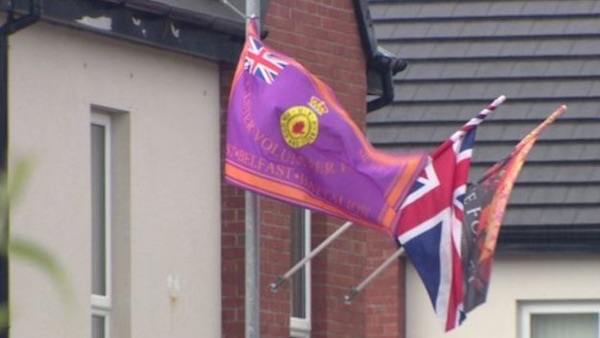
Loyalist flags which have again appeared in a middle class area of east Belfast have goaded Belfast City Council to pass a motion to bring legal action against the Six County government at Stormont.
The council passed a Sinn Féin motion calling for the Department for Infrastructure to be brought to court over its refusal to remove paramilitary flags and banners from lamp posts.
It comes after unionist paramilitary flags appeared in the Cantrell Close area where they have previously caused controversy. The area was once a prototype for other new ‘shared spaces’ which would project a positive image of ‘normalised’ Belfast.
But two years ago, a number of Catholic families were forced to leave after receiving threats relating to the flags. This year is now the third the area has been marked out by the loyalist UVF, infuriating cross-community politicians as well as nationalists.
Paramilitary flags and banners are erected in scores of cities and towns across the North at this time every year, mostly in tandem with the usual Union Jacks and other non-paramilitary flags erected by the Orange Order.
In theory, the new motion should force the British government to remove paramilitary flags unless a ‘flags protocol’ is in place. Loyalists have argued that as some of the UVF flags are dated 1912, they should be considered ‘commemorative’.
The motion, which had the support of the SDLP, Alliance and the Greens, stated that the council was “alarmed at the increasing number of offensive displays of banners and paramilitary flags across Belfast”.
Sinn Féin’s Ciaran Beattie, who proposed the motion, also said that banners supporting British Army regiments were being used “to divide, offend and cause hurt to victims. Re-traumatising victims with offensive displays is wrong and should have no place in our society.”
In recent months, a number of flags and banners were put up in support of the Parachute Regiment after a British soldier was charged with two murders during the Bloody Sunday massacre. Members of the PSNI police have been seen to act in support of those erecting the banners.
The newly appointed PSNI chief Simon Byrne has refused to take action unless a banner is “completely offensive”.
Speaking on his first day in office, he said: “Sometimes if a banner or flag is completely offensive, we may need to act differently in the moment, but broadly I think it’s patience, it’s about dialogue and acting with a dose of common sense.”
Parachute Regiment flags were put up in the centre of the predominately nationalist towns of Lurgan and Omagh this week. In Lurgan, a flag was hoisted near a Sinn Féin office by men in high-visibility vests using a cherry picker. A confrontation ensued with local residents, before the PSNI arrived at the scene to safeguard the area for the loyalists.
Community worker Paddy McMenamin was very upset at the erection of the flags. He said he had been prevented from taking photos by ‘a number of loyalists who stood in front of me.’
He said the PSNI arrived and he was told he could be accused of causing a breach of the peace. “I ask him was putting up para flags not a breach of the peace,” he said.
Derry City and Strabane District Council has heard calls for a similar motion to Belfast after banners appeared there. Among the areas where Parachute Regiment flags have been flown is Caw Roundabout, a main road leading into Derry. A similar motion was brought at Armagh, Banbridge and Craigavon Council last month.
Joe McKinney, whose brother Willie was shot dead by the Parachute Regiment on Bloody Sunday, said: “I think it’s outrageous that people go to these extremes to hurt people. I feel very angry.”
But the hardline unionist DUP said taking legal action against the Stormont department would be a “mistake”. Group leader George Dorrian said: “To try to force a government department to go down this way, we believe, will just heighten tensions and will serve to alienate a large section of the community.”
Dorrian said the erection of loyalist paramilitary flags and banners was “a tradition”.
“This sweeping action to remove all flags and emblems is not practical or helpful,” he said.
“This instead will aggravate tensions while some are spending time on the ground working to improve community relations. That is where time should be spent.”
![[Irish Republican News]](https://republican-news.org/graphics/title_gifs/rn.gif)
![[Irish Republican News]](https://republican-news.org/graphics/title_gifs/harp.gif)

